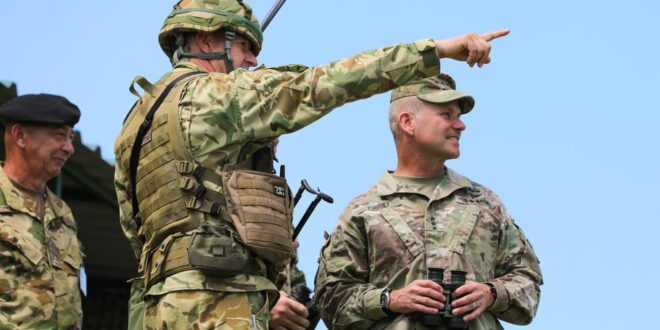The American general slated to become NATO’s next supreme allied commander warned Thursday that Russia’s blockade of Ukrainian grain exports could enable terrorist networks in other parts of the world and may require U.S. military intervention to ensure global markets don’t become destabilized.
Gen. Christopher Cavoli, commander of all U.S. Army forces in Europe and Africa, told members of the Senate Armed Services Committee that groups including the Islamic State, al-Shabab and Boko Haram stand to benefit from food shortages resulting from the war. Those groups “feed on weak governance and food insecurity and corruption and poverty,” he said, noting they already have been “doing fairly well” in Africa in recent years. “A food shortage now would just exacerbate the situation down there.” Cavoli appeared on Capitol Hill as part of the confirmation process to lead U.S. and NATO forces in Europe.
Russia’s navy effectively controls all traffic in the northern third of the Black Sea, according to U.S. intelligence assessments, and Western officials have accused Moscow of using food as a form of blackmail. The Kremlin’s spokesman, Dmitry Peskov, said earlier Thursday that commercial ships carrying Ukrainian grain would not be allowed to leave from any Black Sea ports until Western governments lift their sanctions on Russia.
Ukraine is the world’s largest exporter of sunflower oil, the fourth-largest exporter of corn and the fifth-largest exporter of wheat. British Foreign Secretary Liz Truss accused Moscow of attempting to “hold the world to ransom” and “essentially weaponizing hunger.” In calling on Russian President Vladimir Putin to end the blockade, she rejected the idea of lifting sanctions and said “any appeasement” would only make the Russian leader “stronger in the longer term.”
Cavoli hinted that, at some point, the U.S. military could get involved in an effort to guarantee that exports from Ukraine can resume. But he declined to say whether he would recommend such an approach, apart from preparing the options requested by civilian leaders, if he’s confirmed.
For now, he said, “it’s going to be a combination of modes of transportation that we’re going to have to use” to get around Russian efforts to stymie grain shipments from leaving Ukraine.
Romania has already made the Black Sea port of Constanta – which is not under blockade – available to exports of Ukrainian grain, though Cavoli noted that accounts only for about 90,000 tons a day. About 22 million tons remain backed up in Ukraine, he said.
German rail line Deutsche Bahn also has begun an operation Cavoli referred to as the “Berlin train lift” – intentionally reminiscent of the Berlin Airlift of 1948 and 1949, when Allied forces flew food and other vital supplies into Berlin to circumvent a Soviet blockade of the roads and rail lines. That option would route Ukrainian grain supplies through Poland, which established a border crossing regime to facilitate such passage, and on to ports on Germany’s northern coast for shipping.
“Some efforts are taking place,” Cavoli told senators, adding: “Much more needs to be done.”
Pentagon spokesman John Kirby, speaking to reporters later Thursday, said “there are no plans to use the United States military, or military sources or assets, to assist in the movement of grain outside of Ukraine.” The Biden administration, he added, is “in discussion with our international partners and allies about how best to address this.”
Cavoli also acknowledged that the influx of Western arms flows into Ukraine poses the risk of weapons smuggling by or to illicit groups who could in turn use them to undermine U.S. interests elsewhere.
“Establishing accountability over where all of that equipment is a vital task for us,” Cavoli said, adding that doing so is “challenging right now” as the United States has no military presence in Ukraine.
“As the conflict winds down or concludes that will be one of the things that I have to get at,” he added, telling senators, “I share your concern on it.”
Cavoli, a Russian-speaker with extensive experience and expertise in the region, would take over at U.S. European Command as Putin, having failed to topple the government in Kyiv, has scaled down his ambitions in Ukraine.
Putin’s forces have made only slow, grinding progress in their renewed campaign to seize territory in eastern Ukraine’s Donbas region, Western intelligence assessments show. The Pentagon on Thursday said that Russian commanders are attempting to entrap Ukrainian forces defending key towns in Donbas even as the Kremlin’s combat losses continue to mount in the face of significant resistance.
The northeastern part of Severodonetsk, a strategic city in the region, appears to have been seized by Russian forces, said a senior U.S. defense official, speaking on the condition of anonymity under ground rules established by the Pentagon. Collectively, this official said, the strategy amounts to “an encirclement effort” meant to cut off Ukrainian forces from reinforcement and resupply of Western weapons.
The war, entering its fourth month, has been a costly endeavor for the Russians, the senior U.S. official said. They’ve lost about a thousand tanks, 350 artillery pieces, three dozen fighter-bomber aircraft and more than 50 helicopters, according to Pentagon estimates. More than 80% of Russia’s go-to fighting units – battalion tactical groups – have been committed to the war effort, the official said, stressing, however, that Russian forces “still have a significant amount of their capability” left to fight.
Ukrainian military officials have claimed their forces have expunged nearly 30,000 Russian troops from the battlefield. The Pentagon has declined to provide an estimate of either side’s casualty figures.
 Eurasia Press & News
Eurasia Press & News



